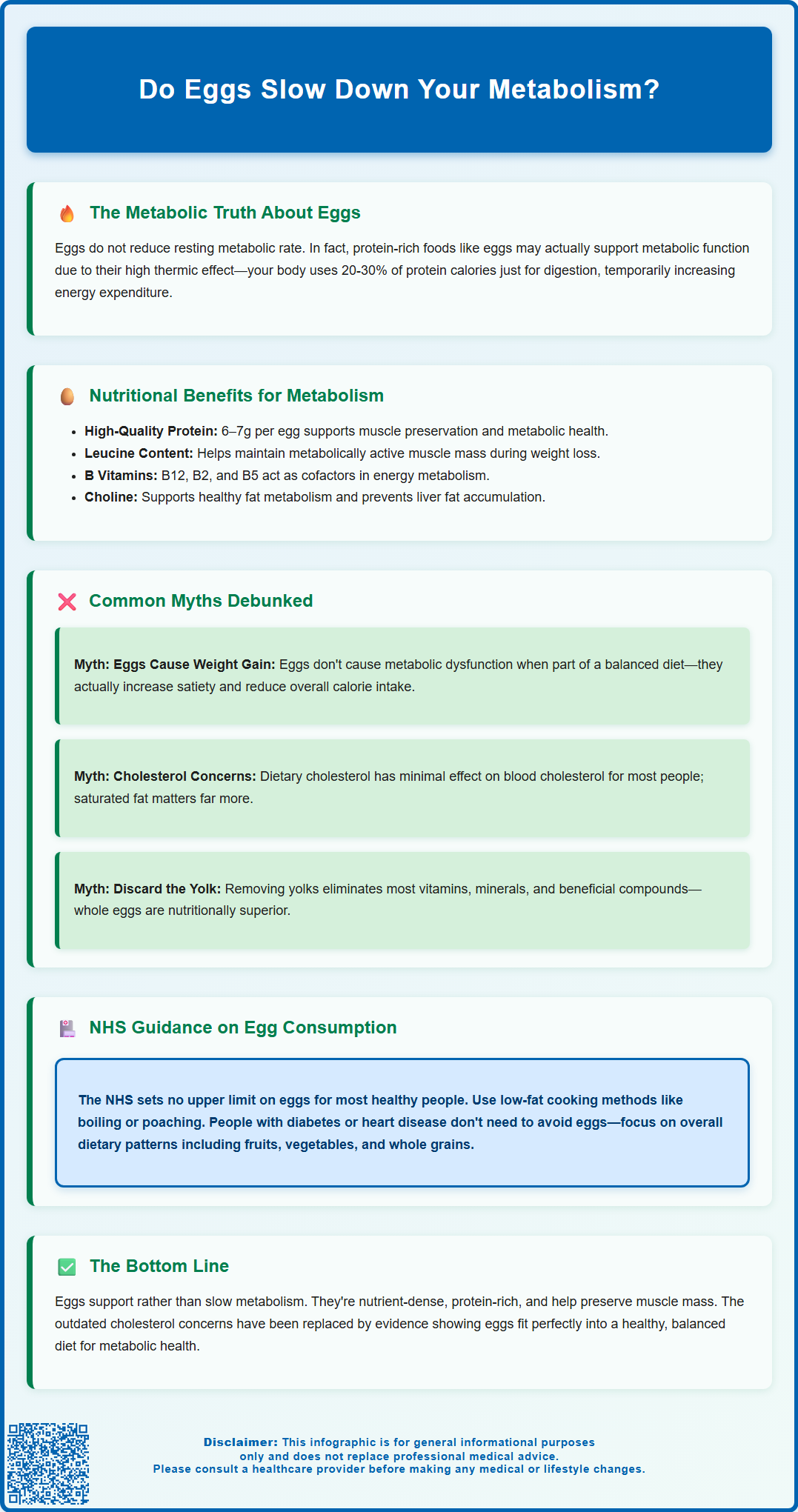Many people wonder whether eggs slow down metabolism, often due to outdated concerns about dietary cholesterol and fat content. The evidence, however, tells a different story. Eggs are a protein-rich food with a high thermic effect, meaning your body expends considerable energy digesting them. Rather than hindering metabolic function, eggs provide essential nutrients—including B vitamins, choline, and high-quality protein—that support energy metabolism and help preserve lean muscle mass. Current NHS guidance does not restrict egg consumption for most healthy individuals, reflecting modern understanding of nutrition and metabolic health.
Summary: No, eggs do not slow down metabolism; their high protein content may actually support metabolic function through increased thermic effect and muscle preservation.
- Protein has the highest thermic effect of all macronutrients, requiring 20–30% of its calories for digestion and processing.
- Eggs contain all nine essential amino acids and provide approximately 6–7g of high-quality protein per large egg.
- B vitamins in eggs (B12, riboflavin, pantothenic acid) serve as cofactors in cellular energy metabolism.
- Current NHS guidance does not specify an upper limit on egg consumption for most healthy individuals.
- Dietary cholesterol from eggs has a modest effect on blood cholesterol for most people, with saturated fat being more influential.
- Individuals with specific health conditions or familial hypercholesterolaemia should consult their GP for personalised dietary advice.
Table of Contents
Do Eggs Slow Down Your Metabolism? Understanding the Evidence
There is no good evidence to suggest that eggs reduce resting metabolic rate. Research indicates that protein-rich foods like eggs may actually support metabolic function through several mechanisms.
Metabolism refers to the complex biochemical processes by which your body converts food into energy. The thermic effect of food (TEF) — the energy required to digest, absorb, and process nutrients — varies depending on macronutrient composition. Protein has the highest thermic effect of all macronutrients, requiring approximately 20–30% of its calories for processing, compared to 5–10% for carbohydrates and 0–3% for fats. Since eggs are an excellent source of high-quality protein, containing all nine essential amino acids, they can increase post-meal energy expenditure temporarily after consumption.
Studies examining egg consumption and metabolic health have found no detrimental effects on metabolic markers in most individuals. Research published in nutrition journals suggests that dietary cholesterol from eggs does not adversely affect metabolic parameters for most people. Furthermore, the protein content of eggs promotes satiety and helps preserve lean muscle mass during weight management, both of which support healthy metabolic function.
The misconception may stem from outdated concerns about dietary cholesterol affecting cardiovascular health, which have since been largely reconsidered by modern research. Current evidence from organisations including the British Heart Foundation indicates that for most people, dietary cholesterol has a modest impact on blood cholesterol levels, with saturated fat intake being far more influential. Individual responses to dietary cholesterol can vary, with some people being more sensitive than others.

Nutritional Benefits of Eggs for Metabolic Health
Eggs provide an exceptional nutritional profile that supports metabolic health through multiple pathways. A single large egg (approximately 60g) contains around 6–7g of high-quality protein, essential vitamins, and minerals, all whilst providing only 70–80 calories. This nutrient density makes eggs particularly valuable for individuals managing their weight or seeking to optimise metabolic function.
The protein in eggs contains leucine, an essential amino acid that plays a crucial role in muscle protein synthesis and metabolic regulation. Maintaining lean muscle mass is vital for metabolic health, as muscle tissue is metabolically active and burns more calories at rest than adipose tissue. Regular consumption of high-quality protein sources like eggs can help preserve muscle mass, particularly important during calorie restriction or as part of healthy ageing.
Eggs are rich in B vitamins, particularly vitamin B12, riboflavin (B2), and pantothenic acid (B5), all of which serve as cofactors in energy metabolism. These vitamins facilitate the conversion of carbohydrates, fats, and proteins into usable energy at the cellular level. Deficiencies in B vitamins can impair metabolic efficiency, making eggs a valuable dietary component for optimal metabolic function.
Additionally, eggs contain choline, a nutrient that supports normal lipid metabolism and liver function. Choline plays a role in the transport and metabolism of fats, and deficiency can lead to hepatic fat accumulation. The yolk also provides fat-soluble vitamins A, D, and E, along with carotenoids like lutein and zeaxanthin. While eggs contain vitamin D, the amounts are modest and variable, so eggs alone are unlikely to meet daily requirements. Vitamin D has been associated with insulin sensitivity and metabolic health in observational studies, though causation requires further investigation.
Common Myths About Eggs and Weight Management
Several persistent myths surround eggs and their role in weight management, often leading to unnecessary dietary restrictions. The most prevalent misconception is that eggs, particularly the yolks, cause weight gain or metabolic dysfunction due to their fat and cholesterol content. However, clinical evidence does not support this claim when eggs are consumed as part of a balanced diet.
One common myth suggests that eating eggs for breakfast leads to increased calorie consumption throughout the day. Research actually demonstrates the opposite: studies comparing egg-based breakfasts to carbohydrate-rich alternatives (such as bagels with equivalent calories) found that egg consumption increased satiety and reduced subsequent calorie intake. A study published in the International Journal of Obesity showed that overweight participants who consumed eggs for breakfast as part of a reduced-calorie diet lost more weight than those eating a bagel breakfast of similar caloric value.
Another misconception is that the cholesterol in eggs directly translates to elevated blood cholesterol levels. Whilst eggs do contain dietary cholesterol (approximately 185–200mg per egg), current evidence indicates that dietary cholesterol has a modest effect on blood cholesterol for most individuals. The liver regulates cholesterol production, typically reducing endogenous synthesis when dietary intake increases. Saturated and trans fats have a far greater impact on blood lipid profiles than dietary cholesterol. Individual responses to dietary cholesterol can vary, with some people being more sensitive (hyper-responders).
Some people believe that consuming only egg whites is necessary for weight management, discarding the nutrient-rich yolk. This practice eliminates approximately one-third to two-fifths of the egg's protein and nearly all the vitamins, minerals, and beneficial compounds found in whole eggs. Unless specifically advised by a healthcare professional for medical reasons, whole egg consumption is generally recommended for optimal nutritional benefit. The key to successful weight management is overall dietary pattern and total calorie intake, not the exclusion of nutritious foods like eggs.
NHS Guidance on Eggs as Part of a Balanced Diet
The NHS provides clear, evidence-based guidance on egg consumption as part of a healthy, balanced diet. Current NHS recommendations do not specify an upper limit on egg consumption for most healthy individuals, representing a significant shift from historical advice that restricted intake due to cholesterol concerns. This change reflects the evolving scientific understanding of dietary cholesterol and cardiovascular health.
According to NHS guidance, eggs can be enjoyed as part of a healthy, balanced diet. The Eatwell Guide, the UK's national food model, includes eggs within the 'beans, pulses, fish, eggs, meat and other proteins' food group, recommending that these protein sources form part of daily intake. The NHS emphasises choosing a variety of protein sources and preparing eggs using cooking methods that don't add excessive saturated fat, such as boiling, poaching, or scrambling with minimal butter.
For specific populations, the NHS provides tailored advice:
-
Pregnant women: Eggs with the British Lion stamp can be consumed raw or lightly cooked, as the risk of salmonella is extremely low. This represents updated guidance recognising improved food safety standards.
-
Infants and young children: British Lion-marked hen eggs can be given to babies from around six months, including runny eggs. Non-Lion eggs should be cooked thoroughly until both white and yolk are solid.
-
Individuals with diabetes or cardiovascular disease: Should follow general healthy eating principles; there is no specific restriction on egg consumption, though overall dietary pattern matters more than individual foods.
-
Immunocompromised individuals and older adults: Should exercise caution with non-Lion eggs and ensure proper cooking and food hygiene practices.
If you have specific health conditions or concerns about incorporating eggs into your diet, consult your GP or a registered dietitian for personalised advice. Those with diagnosed hypercholesterolaemia or familial hypercholesterolaemia may receive individualised guidance. The NHS emphasises that overall dietary pattern — including fruit, vegetables, whole grains, and limiting saturated fats, salt, and added sugars — is more important for metabolic and cardiovascular health than any single food item.
If you suspect an egg allergy, speak to your GP. Seek urgent medical help (call 999) if you experience severe allergic reactions such as difficulty breathing, swelling of the face or throat, or severe skin reactions after consuming eggs.
Frequently Asked Questions
Can eating eggs help with weight management?
Yes, eggs can support weight management by increasing satiety and reducing subsequent calorie intake. Studies show that egg-based breakfasts lead to greater feelings of fullness compared to carbohydrate-rich alternatives of similar caloric value.
Should I avoid egg yolks for better metabolic health?
No, egg yolks contain valuable nutrients including B vitamins, choline, and fat-soluble vitamins that support metabolic function. Unless advised by a healthcare professional for specific medical reasons, whole egg consumption is generally recommended for optimal nutritional benefit.
How many eggs can I safely eat per week according to NHS guidance?
Current NHS recommendations do not specify an upper limit on egg consumption for most healthy individuals. Eggs can be enjoyed as part of a balanced diet, though those with specific health conditions should consult their GP for personalised advice.
The health-related content published on this site is based on credible scientific sources and is periodically reviewed to ensure accuracy and relevance. Although we aim to reflect the most current medical knowledge, the material is meant for general education and awareness only.
The information on this site is not a substitute for professional medical advice. For any health concerns, please speak with a qualified medical professional. By using this information, you acknowledge responsibility for any decisions made and understand we are not liable for any consequences that may result.
Heading 1
Heading 2
Heading 3
Heading 4
Heading 5
Heading 6
Lorem ipsum dolor sit amet, consectetur adipiscing elit, sed do eiusmod tempor incididunt ut labore et dolore magna aliqua. Ut enim ad minim veniam, quis nostrud exercitation ullamco laboris nisi ut aliquip ex ea commodo consequat. Duis aute irure dolor in reprehenderit in voluptate velit esse cillum dolore eu fugiat nulla pariatur.
Block quote
Ordered list
- Item 1
- Item 2
- Item 3
Unordered list
- Item A
- Item B
- Item C
Bold text
Emphasis
Superscript
Subscript












